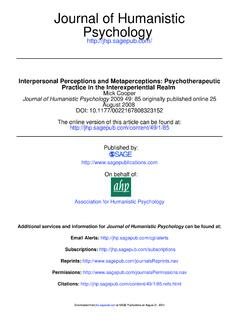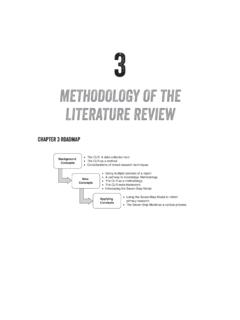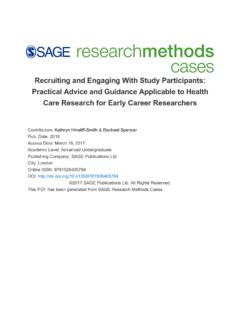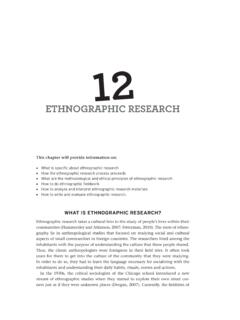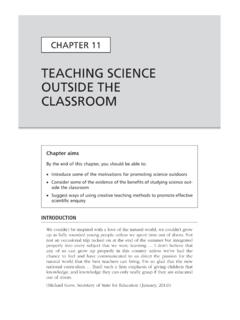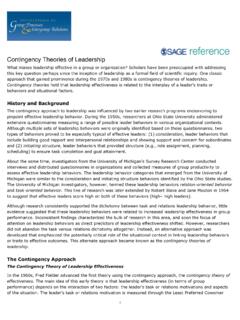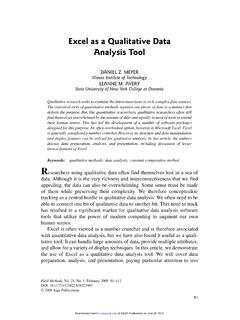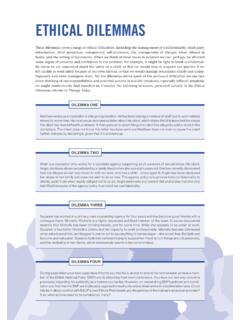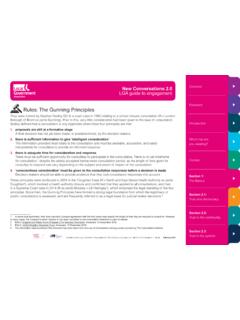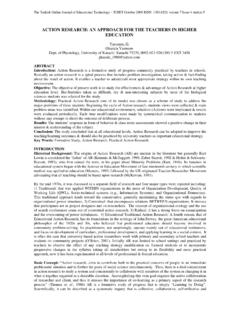Transcription of ETHICAL GUIDELINES FOR EDUCATIONAL RESEARCH
1 ETHICAL GUIDELINESFOR EDUCATIONAL RESEARCHF ourth edition (2018) Published in 2018 by the British EDUCATIONAL RESEARCH AssociationBritish EDUCATIONAL RESEARCH Association (BERA) 9 11 Endsleigh Gardens London WC1H 020 7612 6987 Charity Number: 1150237 DownloadThis document is available to download from: referring to or quoting from this document in your own writing, our preferred citation is as EDUCATIONAL RESEARCH Association [BERA] (2018) ETHICAL GUIDELINES for EDUCATIONAL RESEARCH , fourth edition, London. to shareThis document is published under a creative commons licence: Attribution-NonCommercial-NoDerivs UK commercial use, please contact FROM THE PRESIDENT .. iiiINTRODUCTION .. 1 GUIDELINES .. 6 Responsibilities to participants .. 6 Consent .. 9 Transparency ..16 Right to withdraw.
2 18 Incentives ..19 Harm arising from participation in RESEARCH ..19 Privacy and data storage ..21 Disclosure ..25 Responsibilities to sponsors, clients and stakeholders in RESEARCH ..26 Methods ..28 Responsibilities to the community of EDUCATIONAL researchers ..28 Responsibilities for publication and dissemination ..32 Authorship ..34 Scope and format ..35 Responsibilities for researchers wellbeing and development ..35 HISTORICAL NOTE ..38 ABOUT BERAThe British EDUCATIONAL RESEARCH Association (BERA) is the home of EDUCATIONAL RESEARCH in the United Kingdom. We are a membership association committed to advancing knowledge of education by sustaining a strong and high quality EDUCATIONAL RESEARCH with our members, BERA is working to: advance RESEARCH quality build RESEARCH capacity foster RESEARCH its inception in 1974, BERA has expanded into an internationally renowned association with both UK and non-UK based members.
3 It strives to be inclusive of the diversity of EDUCATIONAL RESEARCH and scholarship, and welcomes members from a wide range of disciplinary backgrounds, theoretical orientations, methodological approaches, sectoral interests and institutional affiliations. It also encourages the development of productive relationships with other associations within and beyond the to be the home of all EDUCATIONAL researchers in the UK, BERA provides opportunities for everyone active in this field to contribute through its portfolio of distinguished publications, its world-class conference and other events, and its active peer community, organised around 30 special interest groups. We also recognise excellence in EDUCATIONAL RESEARCH through our range of awards. In addition to our member-focussed activity, we aim to inform the development of policy and practice by promoting the best quality evidence produced by EDUCATIONAL an organisation we are committed to principles of openness, integrity and transparency, and seek to uphold ETHICAL values in all our activities and from the presidentiiiLETTER FROM THE PRESIDENTDear colleague,On behalf of the Council of the British EDUCATIONAL RESEARCH Association (BERA), I am very pleased to present to you our fourth edition (2018) of the ETHICAL GUIDELINES for EDUCATIONAL related to education is varied and complex, rarely amenable to precise measurement or given to all-encompassing solutions to its many challenges.
4 Nevertheless, the continued pursuit of improved knowledge and understanding of all aspects of education is vital for our democracy and social wellbeing. To this end, these GUIDELINES are designed to support EDUCATIONAL researchers in conducting RESEARCH to the highest ETHICAL standards in any and all s GUIDELINES unequivocally recognise and celebrate the diversity of approaches in EDUCATIONAL RESEARCH , and promote respect for all those who engage with it: researchers and participants, academics and professional practitioners, commissioning bodies, and those who read and utilise the RESEARCH . They are not rules and regulations, but they do represent the tenets of best ETHICAL practice that have served our community of researchers well in the past and will continue to do so in the new GUIDELINES are greatly extended in length in comparison with their predecessors.
5 This has been found appropriate in order to take account of the many changes that have taken place in the last few years, including the rise of social media and online communities, new legislative requirements, and the growing impact on our RESEARCH of internationalisation and globalisation. As time goes on, ETHICAL GUIDELINES for EDUCATIONAL RESEARCH | BERAivBERA Council will continue to review the GUIDELINES and will update them as necessary. I hope that you will find them of assistance in your work, and that you will commend them to everyone who carries out, participates in or makes use of EDUCATIONAL best wishes, Gary McCulloch President, British EDUCATIONAL RESEARCH Association June 2018 Introduction1 INTRODUCTIONThe intended audience for these GUIDELINES is anyone undertaking EDUCATIONAL RESEARCH be they people whose job description includes RESEARCH , or others who, for a variety of reasons (including studying for a qualification or with the intention of improving practice), conduct RESEARCH within the field.
6 This includes both independent researchers and those based in EDUCATIONAL institutions of any kind (including but not limited to early years settings, schools, colleges and universities).The Association expects its members to conduct themselves in a way that reflects its vision, aims and ETHICAL values (as stipulated in the BERA code of conduct1). For this reason, the British EDUCATIONAL RESEARCH Association (BERA) recommends that members make use of these GUIDELINES (and/or other ETHICAL GUIDELINES , where relevant or required), and expects that they will adhere to their spirit and underlying principles (described later) and apply them with integrity in their RESEARCH activities so that their actions can be seen to be ETHICAL , justifiable and sound. It is the hope of the Association that these GUIDELINES will attract widespread consideration and use by those engaged in carrying out, sponsoring or using EDUCATIONAL RESEARCH who are not BERA members.
7 For a great deal of EDUCATIONAL RESEARCH activity, the application of these GUIDELINES will not be problematic, but in some cases dilemmas may arise. We recognise that since few ETHICAL dilemmas have obvious or singular solutions, researchers will take different and creative approaches to resolving them. Certain dilemmas are flagged up within these GUIDELINES , but others that cannot be covered here will also arise. GUIDELINES that state what action 1 British EDUCATIONAL RESEARCH Association [BERA] (2017) BERA Handbook: Member Code of Conduct , London. GUIDELINES for EDUCATIONAL RESEARCH | BERA2 should be taken may not be appropriate to all circumstances; in particular, different cultural contexts are likely to require situated judgments. Furthermore, some kinds of RESEARCH may require ETHICAL clearance from other bodies, such as the National Health Service (NHS), which commit researchers to acting in accordance with their GUIDELINES .
8 In sum, and for each RESEARCH project, researchers will need to devise specific ETHICAL courses of action which may incorporate elements from more than one set of GUIDELINES those of both the NHS and BERA, for example. To do this, they may draw on ETHICAL approaches that reflect a range of philosophical orientations (virtue ethics, or deontological ethics, for example). It is adherence to the spirit of the GUIDELINES that we consider most vital to protect all who are involved in or affected by a piece of RESEARCH . In addition to these GUIDELINES , support and links to related resources are offered wherever recommend that at all stages of a project from planning through conduct to reporting EDUCATIONAL researchers undertake wide consultation to identify relevant ETHICAL issues, including listening to those in the RESEARCH context/site(s), stakeholders and sponsors.
9 This means that ETHICAL decision-making becomes an actively deliberative , ongoing and iterative process of assessing and reassessing the situation and issues as they recommends that researchers bring these GUIDELINES to the attention of those they work with including, for example, participants, stakeholders, sponsors and commissioners of RESEARCH , schools and other organisations and encourage and support those contacts to engage with them. BERA hopes that these GUIDELINES will inform the training of students enrolled on education and RESEARCH degrees, and recommends that local ETHICAL review 2 Furthermore, it is BERA s ambition to produce and publish a series of case studies that illustrate how researchers have put ETHICAL GUIDELINES and principles into practice within specific projects and contexts.
10 This document, and its associated webpages, will be updated with details of these case study publications as and when they are make use of them in support of their own is recommended that, in addition to vetting applications, committees should consider how to foster opportunities for follow-up dialogue to reveal whether and how researchers have acted in consideration of BERA and/or local ETHICAL principles throughout an entire GUIDELINES are intended to promote active and concrete responses following from a deliberation of the issues. Researchers and their students and collaborators should in their RESEARCH proposals, reports, funding applications, work with schools and so on explicitly indicate how they are adhering to those points included in these GUIDELINES that are salient to their is recognised that EDUCATIONAL researchers whose work is conducted under the auspices of an EDUCATIONAL institution will be required to seek ETHICAL review and clearance from that institution.
